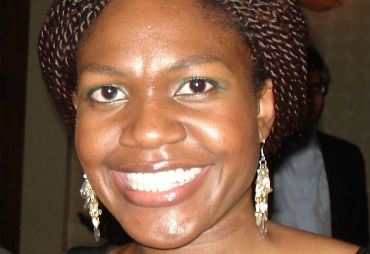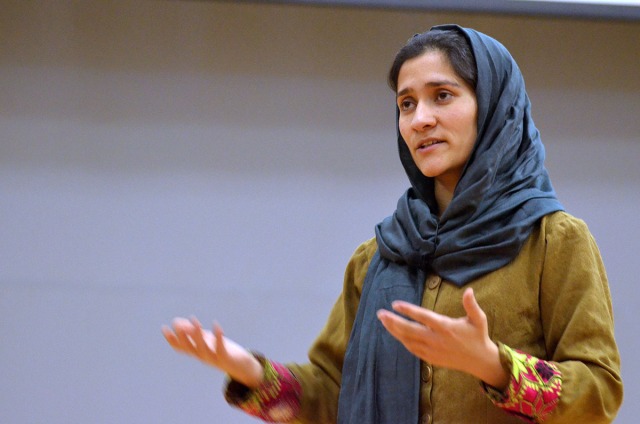By Onyedikachi Achilike

The RH Power Girl series showcases thought leaders within the literacy, education advocacy, female and youth empowerment space. Today we spotlight Misan Rewane, the CEO of West Africa Vocational Education-WAVE Academy. WAVE tackles youth unemployment by screening, training, and placing local West African youth in hospitality and retail jobs within the region. A Sanford and Harvard trained Economist, Misan is passionate about improving the lives of young people in Africa.
Great to have you Misan! Can you tell us what growing up and schooling in Nigeria were like?
Growing up in Nigeria in the 80’s was great. I was the eager student who always looked forward to going to school. My teachers had such a positive impact on me, so much so that I initially wanted to be a teacher.
I went to an all-girls high school, The Lagoon Secondary School in Lagos. My time at Lagoon was truly amazing. The atmosphere there was competitive yet friendly, innovative and collaborative. There was a combined focus on quality education and character building, which gave us a holistic and unique experience. My class was the first set of students to graduate so I guess you can say we were the guinea pigs. I think in most childhood experiences your input does not matter. Children are always taught to be silent and let the adults take charge but here, our opinions and input mattered. As I look back, I see that we were instrumental in creating the school’s culture.
Being in an all-girls school was empowering because gender posed no limitation on anything, be it sports, activities, or even male character roles in school plays, we pretty much did it all. Growing up in this context framed my personality and who I am today, because although I am aware of societal perceptions on gender, I don’t think or act in a gendered lens.
As I moved onto post-secondary education and career goals, I knew that I wanted to further the study of Economics. I spent 2 years in the UK for A-levels, and then went on to Stanford to complete a Bachelors in Economics. Some of my highlights at Stanford were two semesters spent abroad-one in Paris and the other at Oxford. While in school and even now, I am constantly working through the question of, “how do I maximize my happiness with all the unlimited wants and limited resources that I have? I find this question relevant across the world: everyone wants more than what they have, and life is all about prioritizing so that you get the maximum outcome.
Given your global educational experience, what are some of the key challenges you find with the education system in Nigeria and Africa as a whole? How can we improve our literacy rates.
I marvel at how the education system has decayed in my short lifetime. We lack quality teachers; there is too much focus on theoretical learning; and our curriculum is not accommodating to all.
One of my favorite quotes right now is: no nation can rise above its education level…no nation can rise above the level of its teachers.
We now have the generation of teachers who have gone through the bad school system. You have literacy and numeracy being taught by individuals who are still struggling with these subjects. So I think the challenge is: how do we reeducate our teachers and change the orientation on who should be one? Back when I wanted to be a teacher my dad said, “you will be poor and unappreciated”. Unfortunately, many Nigerians echo his line of thinking and frankly nobody wants to be unappreciated. So this mindset has to be changed, and it can only happen when we set new standards for who is to be an educator. Currently, the teacher is the student at the bottom of the class who couldn’t get into other programs and ends up going to the college of teaching schools, which is just not for the brightest kids.
Another issue with our school system is the lack of career counseling given to students. Problem solving and critical thinking skills are not taught. We essentially have this crippling system whereby students memorize and regurgitate information to get good grades and there is just more to life than getting A’s. They are not prepared for real-time jobs; students are essentially learning in a vacuum and receive no real exposure. People often think that quality education is one that exposes children by taking them abroad; I disagree and retort that exposure is a state of mind completely independent of location. Creating intellectual curiosity in young people through play should be encouraged, as it can be a way to coach them through self and career path discovery.
In highlighting some of these issues, I am optimistic that over time with the right leadership, these challenges will be addressed and literacy rates will mirror progress.
You started WAVE in 2013, what inspired this venture?
While in Business school, I met fellow West Africans who were passionate about alleviating the many challenges young people on the continent face. We got together at the Harvard innovation lab and started white boarding ideas. We knew that whatever we came up with had to be linked to job creation and giving people higher income.
WAVE was birthed out of this dialogue and made the second year of business school zoom by so fast. All my courses came alive because I now had a practical idea I could use as a lens in everything I was learning: marketing, accounting, finance, you name it! I went back to Nigeria twice that year. I applied for funding that enabled me to test the viability of this idea with potential clients: companies and job seekers. From this trial I was able to glean attributes that matured the idea. I then came back to the states and applied for the Harvard new venture competition in April. We were the runner-up for the social enterprise track and armed with seed funding from this competition, I decided I was going to move back to Nigeria and give the idea a shot. “To whom much is given, much is expected”. I just had to do it.
So the model end-to-end is that we get young people ready to work and connect them to entry-level jobs. We identify self-motivated, willing to learn, hardworking individuals and train them in communication skills, emotional intelligence, and other soft skills. Everything that we are doing is centered on connecting them to partners in our network. We train them with an eye to the hospitality and retail sectors, particular honing in on how to manage a customer experience.
We started with a pilot of 12 students in a classroom, the first 9 got jobs within 1-2 months. We reported these results to some foundations that were interested in our work, and 6 months into my time in Nigeria, I was able to hire staff and give myself a salary with funding from these foundations.
Impressive! What is the future trajectory of WAVE, can you share some of your plans for this year?
We have a learning by doing culture here at WAVE, and we are all about using this learning to build a replicable model that is globally functional. We want to show the world how to screen young people for their inabilities; how to train them on soft skills and make them work ready; how to connect them with jobs; we also want to encourage employers to change the paradigms around how they hire.
Our immediate focus is to expand throughout Lagos and nationally and eventually in other countries.
Delving into a more broad yet prevalent topic: Young African girls are often detracted from education and coerced into early marriage, prostitution, and the like, what advice would you give to them and girls in general?
That’s a tough one. I will go with a Steve Jobs quote on this one: don’t let the noise of other opinions drown out your inner voice. Take time to find what you are good at and passionate about, what matters, something that you can turn into a vocation, the intersection of all these is your purpose. Protect and guard your purpose as hard as you can because the world will try to sell you easier-to-accomplish dreams, telling you to lower your standards. Never settle and hold yourself to high standards, the only person that can limit you in life is yourself. So in short, you must find your purpose, guard it, never settle, and make it a reality.
When you do become successful by the world’s standards, refuse your own success and continue to push yourself. Find that balance of being humble in all your accomplishments but also refusing your own success, let that refusal be what pushes you forward to wake up every morning and bring your best.
Who is your role model and why?
I find role models in real life-your everyday hardworking people. I look up to people like my mother and sister. My mom worked all her life, but would always come home and make a meal. She showed me that being a woman is tough, but you still have to bring your A game both at work and at home.
I look up to my sister who has lived and worked all over the world and others like her who constantly push beyond their comfort zone.
Lastly, because we are such bookworms here, what were some of your favorite novels growing up and what are you currently reading?
Currently- Quiet: The Power of Introverts in a World That Can’t Stop Talking by Susan Cain
Favorite books-Yoruba Girl Dancing and Not With Silver both by Simi Bedford.
It has been such a pleasure speaking with you Misan, is there anything else you’d like to add?
This has been fun, I am excited about what Reading Hamlets is doing in the literacy space, and I hope someone reads this interview and gets thinking and doing!
Follow WAVE:
Website: http://waveacademies.org
Twitter: https://twitter.com/waveacademies
Facebook: https://www.facebook.com/WestAfricaVocationalEducationWave











